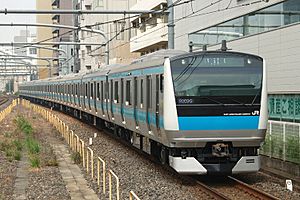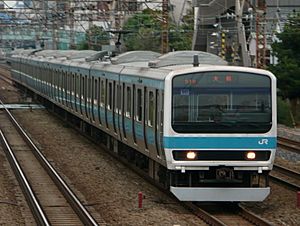Keihin-Tōhoku Line facts for kids
Quick facts for kids Keihin-Tōhoku Line |
|
|---|---|

A Keihin-Tohoku Line E233 series EMU at Saitama-Shintoshin Station
|
|
| Overview | |
| Locale | Tokyo, Saitama, Kanagawa prefectures |
| Stations | 35 |
| Service | |
| Type | Heavy rail |
| Operator(s) | JR East |
| Depot(s) | Saitama |
| Rolling stock | E233-1000 series |
| Daily ridership | 2,974,504 (daily 2015) |
| History | |
| Opened | 1914 |
| Technical | |
| Line length | 59.1 km (36.7 mi) |
| Track gauge | 1,067 mm (3 ft 6 in) |
| Electrification | 1,500 V DC overhead catenary |
| Operating speed | 90 km/h (55 mph) |
The Keihin-Tōhoku Line is a railway line in Japan which connects the cities of Saitama, Kawaguchi, Tokyo, Kawasaki, and Yokohama. It is part of the East Japan Railway Company (JR East) network. The Keihin-Tōhoku Line officially follows portions of the Tōhoku Main Line and Tōkaidō Main Line. Between Ueno and Akabane stations the Keihin-Tohoku and Tohoku Main lines are physically separate and thus alternate routes.
Most Keihin-Tōhoku Line trains have a through service onto the Negishi Line between Yokohama and Ōfuna stations. As a result, the entire service between Ōmiya and Ōfuna is typically referred to as the Negishi Line on system maps and in-train station guides. Keihin-Tōhoku Line trains are recognizable by their light blue stripe (the line's color on maps is also light blue).
As of January 2010, all Keihin-Tohoku Line services are formed of E233-1000 series 10-car electrical multiple unit (EMU) trains. These were phased in from December 2007, and replaced the previous 209 series 10-car EMUs by 24 January 2010. All Keihin-Tohoku Line rolling stock is based at Urawa Depot. Yokohama Line E233-6000 series 8-car EMUs also operate on through services over the Keihin-Tohoku Line between Higashi-Kanagawa and Ofuna stations.
Other pages
Images for kids
-
Morning peak on the Keihin-Tohoku and Yamanote Lines at Ueno Station
See also
 In Spanish: Línea Keihin-Tōhoku para niños
In Spanish: Línea Keihin-Tōhoku para niños











